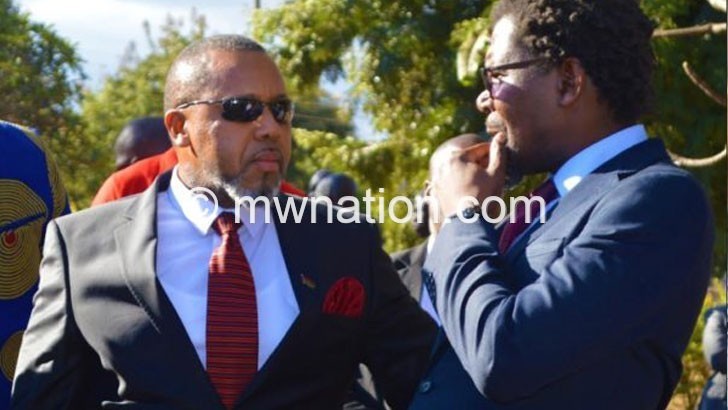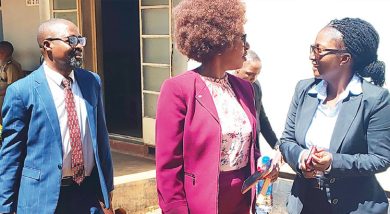Chilima details Irregularities
UTM Party president Saulos Chilima, the first petitioner in the presidential elections nullification petition case, yesterday highlighted irregularities that should compel the Constitutional Court to nullify President Peter Mutharika’s victory in the May 21 Tripartite Elections.
In a final submission aided by a PowerPoint presentation, Chikosa Silungwe, a member of Chilima’s legal team, said the elections should be nullified because Malawi Electoral Commission (MEC), the second respondent in the matter, failed to adhere to constitutional provisions governing management of elections in the country.
He calmly told the court that there were three key questions for the five-judge panel of the High Court of Malawi sitting as the Constitutional Court to decide.

Said Silungwe: “Whether MEC breached its duties in connection to Section 76? Whether MEC breached its duties under Section 77 of the Constitution; and, whether MEC infringed rights of the petitioners and citizens under Section 40 of the Constitution.”
Through the presentation, the lawyer referred the judges to the evidence laid in court, including details of the votes that were either altered or suspicious for several reasons.
Silungwe also dismissed the defence theories and tactics of Attorney General Kalekeni Kaphale who is representing MEC in his capacity as chief legal adviser to the government and the conduct of MEC in general both during the six-month long hearing and during the disputed elections.
He told the court: “Throughout the case, the Attorney General has issued ‘the monitors-were-there defence’, but monitors have never run an election.
“There were incidences when witnesses said presiding officers did not sign [result sheets], but the Attorney General quickly shot back: ‘Did the monitors sign?’ This is negligence of duty. It’s also a criminal offence.”
Silungwe also attacked Kaphale for his “obsession with numbers”, inviting the court to consider the argument about how poorly run elections could not be trusted to produce right figures. He cited the elections case in Kenya where the court nullified the results of the elections not based on the total number of votes affected, but on the qualitative aspects of the elections.
He said the petitioners had brought to court a case questioning the integrity of the results, arguing “integrity does not answer the quantitative question relating to an election”.
Silungwe also drew the court’s attention to the absence of evidence by MEC chairperson Jane Ansah—a judge of the Malawi Supreme Court of Appeal—or any of MEC’s commissioners and the conduct of MEC in its dealings with audit firm BDO. He highlighted that the audit firm’s report made several adverse findings about the electoral body.
He concluded: “The results of 21 May was a false record which the nation was made to believe.”
Silungwe also presented a summary of the evidence his client brought into the case, saying, among others, that 1 122 form 66Cs inspected were altered manually, thereby affecting 1 330 486 valid votes, representing 26 percent of the votes.
He also said 1 527 form 66Cs, affecting 1 593 334 votes cast, representing 31 percent of the votes, were found to be duplicates and not original tally sheets while 172 fake form 66Cs, affecting 188 172 votes cast and representing four percent of the votes, were used in the elections.
Further, Silungwe said 442 form 66Cs affecting 524 340 votes, representing 11 percent of the votes had alterations with correctional fluid Tippex while 1182 forms 66Cs, affecting 1 120 120 and representing 21 percent of the votes were not signed for by monitors.
With Silungwe done and dusted, it was the turn of Modecai Msisha, leading the legal team of second petitioner and Malawi Congress Party (MCP) president Lazarus Chakwera, who primarily focused on the constitutional principles governing MEC.
The court adjourned for the day’s business around 6.30pm while Msisha, one of the framers of the Republican Constitution, was still making his final oral submissions.
He is expected to wind up his remaining one hour and 20 minutes today before Kaphale and lawyer Frank Mbeta, who is representing President Peter Mutharika as the first respondent, make their submissions.
Earlier, the five-judge panel comprising Healey Potani, Ivy Kamanga, Redson Kapindu, Mike Tembo and Dingiswayo Madise took turns to grill lawyers representing Malawi Law Society (MLS) as ‘Friends of the Court’ in the matter over the absence of several details in their submission.
Kapindu asked MLS lawyer Alick Msowoya whether his team wanted the court to place greater importance to rights of the voters or candidates in the matter.
Kamanga inquired from the society on its position on how the court should treat incidents where MEC diverted from the stipulated election management procedures when some evidence suggest the arrangement was agreed by all parties to the elections and considered to be convenient.
MLS and Women Lawyers Association (WLA), as Friends of the Court, took sharply contrasting positions on the issue of burden of proof.
WLA lawyer Barnadette Malunga asked the court to recommend law reforms to help solve future presidential elections disputes, including new provisions stipulating that the president-elect should not be inaugurated when election disputes are in court.
She also said the issue of burden of proof should be clearly stipulated in the law that both the petitioners and MEC have burden of providing evidence.





